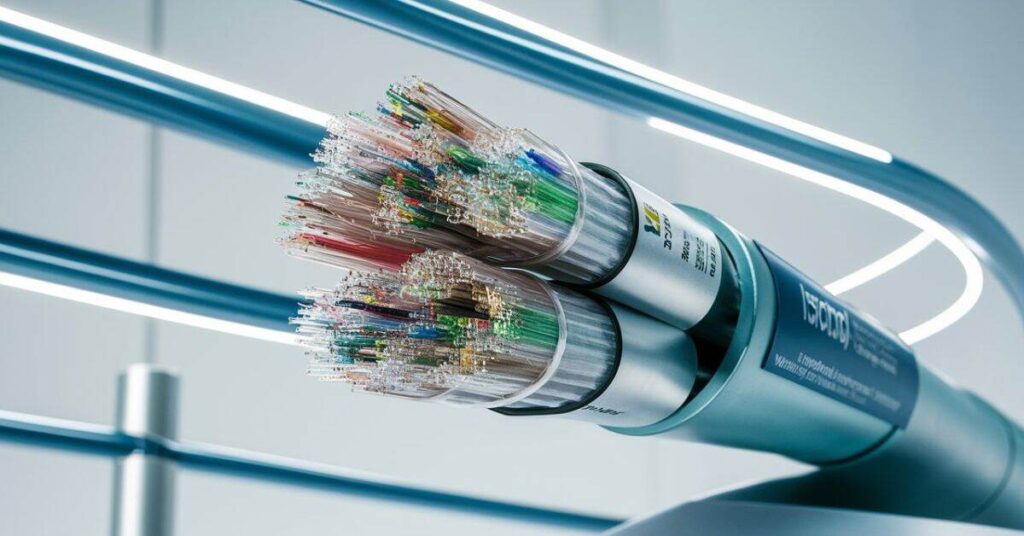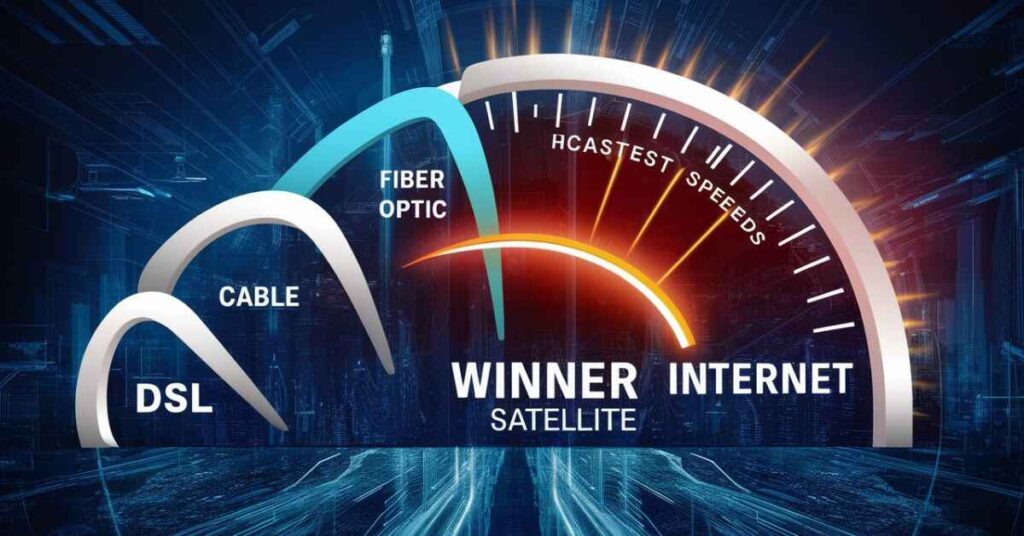
In our virtual age, speedy internet speeds are essential for seamless online reviews, whether or not or now not you are streaming movies, video conferencing, or gaming online. With such a lot of internet technology, it can be complicated to decide which gives the fastest transmission speeds. In this comprehensive guide, we can discover the special internet technologies and help you understand which reigns first-class in pace. Which of the following Internet Technologies Provides the Fastest Speeds.
What Types of Internet Are Available?
DSL, Fiber, and Cable
The 3 maximum not unusual styles of internet connections are DSL (Digital Subscriber Line), fiber-optic, and cable net. Let’s take a closer check at how every generation works and its fundamental tempo abilities.
DSL (Digital Subscriber Line) makes use of present cellphone strains to transmit records. While it changed into as soon as a popular choice, DSL has been exceeded by way of extra latest technology in phrases of pace. Typical DSL speeds vary from 3 Mbps to fifteen Mbps, irrespective of the truth that some businesses offer higher-tier plans as an awful lot as a hundred Mbps in select regions.
Fiber-optic internet uses skinny strands of glass or plastic to transmit facts through the use of mild pulses. This technology gives incredibly fast speeds, with many groups presenting plans up to a minimum of one Gbps (1,000 Mbps) or better. Fiber has appreciably appeared because of the truth the fastest and most dependable internet generation is presently available.
Cable net uses the identical coaxial cables that supply cable TV signs.
Cable speeds can vary extensively, but most carriers offer plans ranging from one hundred Mbps to at least one Gbps. While cable can be fast, it could enjoy slower speeds for the duration of top usage instances because of community congestion. Which of the following Internet Technologies Provides the Fastest Speeds.
Fixed Wireless
Fixed wi-fi net is a type of internet service that makes use of radio waves to transmit facts from a set region to man or woman houses or agencies. It can be a feasible choice in regions in which different net technologies are not available. However, constant wi-fi speeds are normally decreased than stressed connections, typically ranging from 5 Mbps to 50 Mbps.
5G
5G is the latest generation of cellular technology, promising faster speeds and lower latency. While 5G has the potential to provide excessive-pace internet right of entry, its actual-world overall performance can vary depending on factors including community congestion and distance from cell towers. Typical 5G speeds vary from 50 Mbps to one Gbps, however, those numbers can be higher or decrease depending on the specific community and region.
Satellite
Satellite internet is a choice for regions where different internet technologies are not available. It uses satellites orbiting the Earth to transmit statistics to and from individual customers. While satellite TV for laptop internet can offer the net right of entry to far-off areas, it normally has decreased speeds and better latency in the evaluation of extraordinary technology. Typical satellite TV for PC television for computer television for computer net speeds vary from 12 Mbps to 100 Mbps.
What Is the Best Type of Internet Connection?
When it involves deciding on a nice form of internet connection, there’s no person-length-fits-all answer. The best preference depends on your specific needs, region, and finances. Here’s a quick contrast of the unique internet technologies:
| Technology | Speed Range | Reliability | Cost |
|---|---|---|---|
| Fiber | Up to 1Gbps or Higher | Very high | Higher upfront cost, but competitively priced for speed |
| Cable | 100 Mbps – 1 Gbps | High | Moderate costs may increase during peak times |
| DSL | 3 Mbps – 100 Mbps | Moderate | Lower cost, but slower speeds |
| Fixed Wireless | 5 Mbps – 50 Mbps | Moderate | Moderate cost may be affected by environmental factors |
| 5G | 50 Mbps – 1 Gbps | High | Moderate to higher cost, dependent on provider and plan |
| Satellite | 12 Mbps – 100 Mbps | Lower due to latency | Higher cost, suitable for remote areas |
If you prioritize speed and reliability, fiber-optic internet is generally the best choice. However, if fiber is not available in your area, cable or 5G may be the next best option, depending on your specific needs and budget. Which of the following Internet Technologies Provides the Fastest Speeds.
How to Know What Type of Internet You Have
- Check your internet service provider’s website: Most ISPs provide information about the types of internet services they offer in different areas. Look for details on your specific plan and technology.
- Look at your modern router: The type of modem or router you have can often indicate the type of internet connection. For example, a DSL modem connects to a phone line, while a cable modem connects to a coaxial cable.
- Run an online speed test: Websites like Speedtest.net or Fast.com can give you an estimate of your internet speed. While not a definitive indicator, the speed range can help narrow down the type of connection you have.
- Contact your ISP: If you’re still unsure, you can always contact your internet service provider directly and ask them about the type of internet connection you have.
Knowing your internet type can help you understand the speed and performance you can expect, as well as any limitations or potential upgrades available.
Which of the Following Internet Technologies Provides the Fastest Transmission Speed?
When it comes to the fastest transmission speeds, fiber-optic internet stands out as the clear winner among the available internet technologies. Here’s a comparison of the maximum speed capabilities of each technology:
DSl
DSL (Digital Subscriber Line) makes use of current cellphone traces to transmit information. While it was once a famous option, DSL has been surpassed by way of more modern technologies in phrases of velocity. The speed for DSL generally tiers from 15 Mbps to 100 Mbps, with the fastest DSL variations supplying as much as 100 Mbps download speeds in pick areas.
Fiber Optic
A fiber-optic net uses thin strands of glass or plastic to transmit statistics regarding the usage of light pulses. This technology gives distinctly rapid speeds, with many providers supplying plans up to one Gbps (1,000 Mbps) or higher. Some fiber carriers, together with Xfinity and AT&T, even offer residential plans with hurries up to six Gbps in pick areas.
Cable
Cable internet uses the same coaxial cables that deliver cable TV signals. While cable can be fast, its maximum speeds are generally lower than fiber-optic internet. Most cable carriers offer plans starting from one hundred Mbps to one Gbps, with some providers like Xfinity and Spectrum offering plans up to at least one.2 Gbps in positive areas. Which of the following Internet Technologies Provides the Fastest Speeds.
Cellular(5G)
5G is the cutting-edge generation of cell technology, promising quicker speeds and decreased latency than previous generations. While 5G can offer immoderate-speed net get right of entry, its real-global performance can vary depending on elements that include community congestion and distance from mobile towers. Typical 5G speeds range from 50 Mbps to at least one Gbps, however, these numbers can be higher or decrease depending on the precise network and place.
Based on the maximum speed capabilities, fiber-optic internet outperforms other internet technologies, making it the fastest option currently available for residential and business use.
What Makes Fiber Internet So Fast?
Data Transmission
Fiber-optic cables use light pulses to transmit data, which can travel longer distances at faster speeds compared to traditional copper cables used for DSL or cable internet. This allows for higher bandwidth and quicker data switch quotes. Which of the following Internet Technologies Provides the Fastest Speeds.
Resilience to Interference
Unlike copper cables, fiber-optic cables are not susceptible to electromagnetic interference, which can degrade the signal quality and slow down data transfer speeds. This makes fiber-optic connections greater reliable and regular.
Unlimited Bandwidth
Fiber-optic net companies can provide sincerely limitless bandwidth, as the generation no longer has identical bandwidth barriers as other internet types. This manner that fiber connections can cope with greater facts visitors without experiencing slowdowns all through top usage times.
Additionally, the fiber-optic era is destiny-proof, as it can be without problems upgraded to support even faster speeds as the era advances. This makes it greater sustainable funding for houses and businesses with growing internet needs.
What Can Affect Internet Speed?
While the type of internet technology plays a significant role in determining maximum speed capabilities, several other factors can impact your actual internet speed:
- Network Congestion: During peak usage times, internet service providers may experience network congestion, which can slow down speeds for all users on the network.
- Distance From the Provider’s Infrastructure: The further you are from your provider’s central office or node, the more likely you are to.
FAQs
Ans: Fiber optics, cable, and 5G are among the top contenders for providing fast internet speeds.
Ans: Fiber optic cables use light signals to transmit data, allowing for much faster speeds compared to traditional copper cables.
Ans: 5G has the potential to offer incredibly fast speeds, but its performance can vary depending on factors like signal strength and network infrastructure.
Ans: Cable internet can offer fast speeds, especially in areas with well-established infrastructure. It’s often more widely available than fiber optic internet.
Ans: Consider factors like availability in your area, your budget, and the level of speed and reliability required for your online activities.






